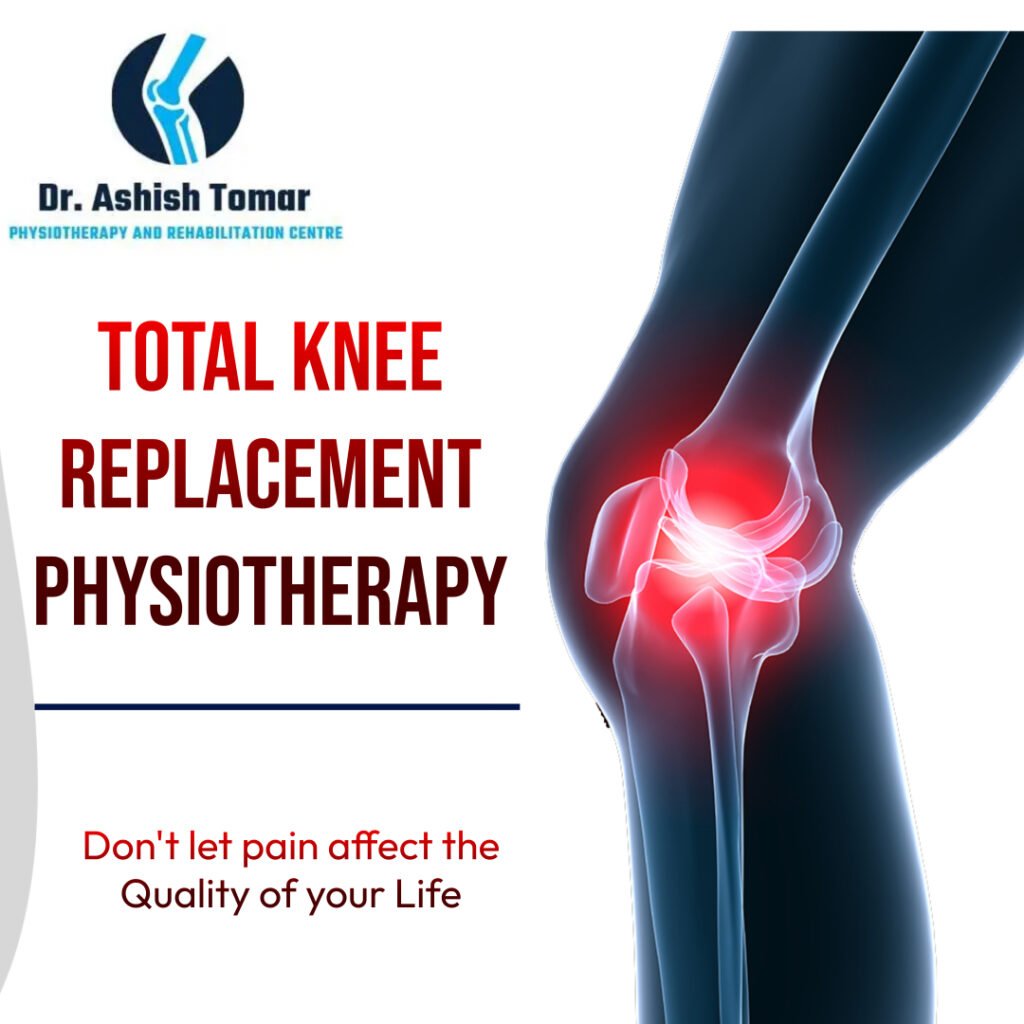No.1Total Knee Replacement Physiotherapy in Delhi

Overview
Total Knee Replacement Physiotherapy is a crucial component of recovery for patients who have undergone knee replacement surgery. It focuses on restoring the knee’s function, improving mobility, and enhancing the patient’s overall quality of life. If you are searching for the best physiotherapist for knee replacement physiotherapy. look no further than Dr. Ashish Tomar, a highly experienced physiotherapist located in Rani Bagh, Delhi. Dr. Tomar specializes in post-operative rehabilitation for total knee replacement patients, offering personalized treatment plans tailored to each patient’s needs. With a focus on restoring mobility, reducing pain, and enhancing strength, Dr. Tomar’s approach ensures a faster recovery and improved quality of life. His clinic is equipped with advanced physiotherapy techniques to support your journey to a pain-free and active lifestyle.
How do I choose a Best Physiotherapist for Total Knee Replacement ?
Choosing the best physiotherapist for total knee replacement rehabilitation is crucial for a successful recovery. but how do you know who’s the best?
1. Specialized Experience
- Check their expertise: Look for a physiotherapist with significant experience in knee replacement rehabilitation. Dr. Ashish Tomar is a highly experienced physiotherapist with extensive knowledge and skills in post-operative care for knee replacement patients. With years of experience.
2. Qualifications and Credentials
- Dr. Ashish Tomar holds a Bachelor of Physiotherapy (BPT) and a Master of Physiotherapy (MPT) in Neuro, showcasing his advanced knowledge in neurological physiotherapy. He is also certified in upper and lower limb mobilization techniques, further enhancing his expertise in post-operative and rehabilitation therapies. As a member of the Global Association of Physiotherapists, Dr. Tomar stays updated with the latest advancements in the field. Additionally, he has been recognized with a National Award by the Worthy Wellness Foundation for his contributions to physiotherapy, solidifying his reputation as a leading physiotherapist in Delhi.
3. Patient Success Stories
- Read patient reviews or seek testimonials from others who have undergone knee replacement rehabilitation. Positive feedback, recovery success stories, and high satisfaction rates often indicate a reliable and skilled physiotherapist.
4. Customized Rehabilitation Plans
- The best physiotherapist will create a personalized treatment plan tailored to your unique needs, considering your age, health status, and post-surgery condition. Ask if they conduct thorough assessments and develop individualized recovery goals.
What Should I Expect During My First Consultation with a knee replacement physiotherapist in Delhi?
Your first consultation is a crucial step in the treatment process. Here’s what you can expect:
1. Comprehensive Evaluation
- The physiotherapist will begin by reviewing your medical history, including details of your knee replacement surgery, any pre-existing conditions, and your overall health.
- A physical examination will be conducted to assess range of motion, strength, swelling, scar tissue, and pain levels in the knee.
- They may ask questions about your daily activities, lifestyle, and personal goals for rehabilitation.
2. Understanding Your Needs
- You will be asked to describe your current challenges (pain, stiffness, difficulty walking, etc.) and how they affect your daily life.
- The physiotherapist will take note of your mobility goals, such as walking without aid, climbing stairs, or returning to a specific activity.
3. Setting Realistic Expectations
- The physiotherapist will explain what you can expect in terms of recovery time and progress.
- They’ll discuss the phases of rehabilitation, starting from gentle exercises to more advanced ones as you heal.
4. Personalized Treatment Plan
- Based on the evaluation, the physiotherapist will design a tailored rehabilitation program. This plan will likely include:
- Range of motion exercises to improve knee flexibility.
- Strengthening exercises to support the knee joint and improve balance.
- Pain management techniques, such as manual therapy or modalities like TENS (Transcutaneous Electrical Nerve Stimulation).
- The plan will be adjusted over time as you progress.
5. Demonstration of Initial Exercises
- The physiotherapist will demonstrate and guide you through the initial exercises you should start at home. These may include simple knee bends, leg lifts, and stretches.
- They will ensure that you understand how to perform these exercises correctly to avoid injury.
6. Education and Guidance
- You will receive guidance on how to manage pain and swelling at home, including ice therapy and elevation techniques.
- They may also discuss the proper use of assistive devices (crutches, walker, or cane) and how to gradually reduce dependency on them.
7. Q&A Session
- You’ll have the opportunity to ask questions about your recovery, what you can and cannot do, and how to maintain a positive mindset during the rehabilitation process.
8. Scheduling Future Sessions
- A schedule for future physiotherapy sessions will be recommended, with an outline of how often you should attend to achieve the best results.
- The physiotherapist will monitor your progress in subsequent sessions and modify your treatment plan as needed.
Which Physiotherapy Techniques Are used by Total Knee Replacement Rehabilitation
In total knee replacement (TKR) rehabilitation, a range of physiotherapy techniques is employed to ensure effective recovery.
1. Range of Motion (ROM) Exercises
- Passive ROM Exercises: Initially, the physiotherapist may assist with movements to help regain flexibility.
- Active ROM Exercises: As recovery progresses, exercises like heel slides, knee bends, and straight leg raises are used to improve joint mobility.
2. Strengthening Exercises
- Quadriceps Strengthening: Exercises such as straight leg raises, quad sets, and leg presses target the quadriceps, crucial for knee support.
- Hamstring Strengthening: Hamstring curls and bridges help strengthen the muscles behind the knee.
- Calf and Glute Strengthening: Activities like calf raises and glute squeezes support overall leg strength and stability.
3. Manual Therapy
- Soft Tissue Mobilization: Techniques to release tension in the muscles and fascia around the knee.
- Joint Mobilization: Gentle, controlled movements to improve knee joint mobility and reduce stiffness.
4. Pain Management Techniques
- Cryotherapy (Ice Therapy): Applying ice packs to reduce swelling and alleviate pain.
- Heat Therapy: Using heat to relax muscles and improve blood flow.
- Transcutaneous Electrical Nerve Stimulation (TENS): A device that uses electrical impulses to manage pain.
5. Functional Training
- Gait Training: Teaching proper walking techniques, often with the aid of assistive devices like crutches or walkers initially.
- Stair Climbing and Functional Movements: Practicing movements like stair climbing and getting in and out of chairs to improve daily function.
6. Balance and Proprioception Training
- Balance Exercises: Exercises such as standing on one leg or using balance boards to enhance stability.
- Proprioceptive Training: Activities to improve your sense of joint position and movement, important for coordinated movement and injury prevention.
7. Hydrotherapy
- Water-Based Exercises: Performing exercises in a pool to reduce joint stress while promoting movement and strengthening. The buoyancy of water supports the knee and reduces the risk of strain.
8. Education and Self-Management
- Home Exercise Program: A set of exercises to perform at home, tailored to your needs and recovery goals.
- Joint Protection and Activity Modification: Advice on how to protect the knee during daily activities and modify movements to prevent overstrain.
9. Assistive Devices
- Supportive Equipment: Use of knee braces, orthotics, or other devices to aid in recovery and ensure proper alignment and support.
10. Functional and Sport-Specific Training
- Gradual Return to Activities: Reintroducing activities or sports as strength and mobility improve, focusing on functional performance relevant to your lifestyle.
Why Dr Ashish Tomar is the Best Physiotherapist for Total Knee Replacement Rehabilitation?
Dr. Ashish Tomar stands out as the best physiotherapist for total knee replacement rehabilitation for several compelling reasons:
1. Specialized Expertise
- Advanced Qualifications: Dr. Tomar holds a Bachelor of Physiotherapy (BPT) and a Master of Physiotherapy (MPT) in Neuro, demonstrating his advanced knowledge in neurological and orthopedic physiotherapy.
- Certification in Mobilization Techniques: He is certified in upper and lower limb mobilization techniques, enhancing his ability to provide targeted and effective rehabilitation.
2. Comprehensive Approach to Rehabilitation
- Personalized Treatment Plans: Dr. Tomar develops individualized rehabilitation programs tailored to each patient’s unique needs, ensuring a customized approach to recovery.
- Wide Range of Techniques: He employs a variety of physiotherapy techniques, including range of motion exercises, strengthening exercises, manual therapy, pain management, and functional training.
3. Recognition and Credentials
- Member of Global Association of Physiotherapists: As a member, Dr. Tomar stays updated with the latest advancements and best practices in physiotherapy.
- National Award: He has been honored with a National Award by the Worthy Wellness Foundation for his contributions to the field of physiotherapy, highlighting his excellence and dedication.
4. Experience and Reputation
- Extensive Experience: With years of experience in knee replacement rehabilitation, Dr. Tomar has a proven track record of successful outcomes and patient satisfaction.
- Positive Patient Feedback: His clinic has received numerous positive reviews from patients who have benefited from his expertise and compassionate care.
5. Advanced Facilities and Techniques
- State-of-the-Art Clinic: Dr. Tomar clinic is equipped with the latest technology and facilities to support effective rehabilitation and ensure a comfortable environment for patients.
- Holistic Care: He integrates various physiotherapy techniques, including hydrotherapy and advanced pain management strategies, to address all aspects of recovery.
6. Commitment to Patient Education
- Clear Communication: Dr. Tomar emphasizes educating his patients about their condition, treatment options, and self-management techniques, empowering them to actively participate in their recovery.
- Supportive Guidance: He provides continuous support and motivation throughout the rehabilitation process, ensuring patients stay on track and achieve their recovery goals.
7. Convenient Location
- Accessible Clinic: Located in Rani Bagh, Delhi, Dr. Tomar clinic is easily accessible, making it convenient for patients to attend regular sessions and follow their rehabilitation plan.
For exceptional care in total knee replacement rehabilitation, Dr. Ashish Tomar offers unparalleled expertise and a patient-centered approach.
Tag: Dr Ashish Tomar Physiotherapist in Delhi Knee Pain Physiotherapy Total knee replacement physiotherapy exercise therapy


Leave a Reply